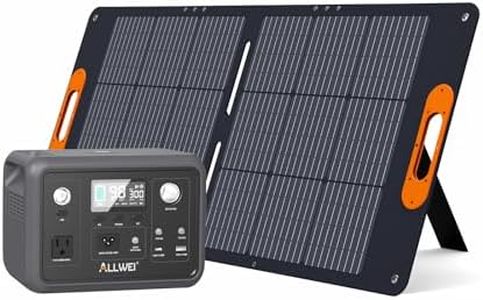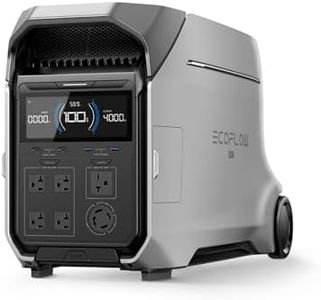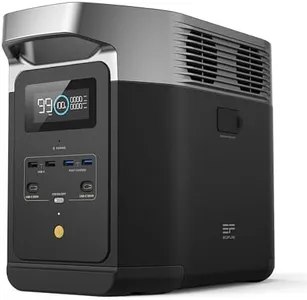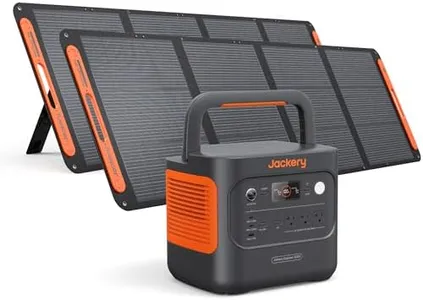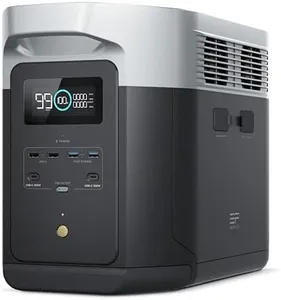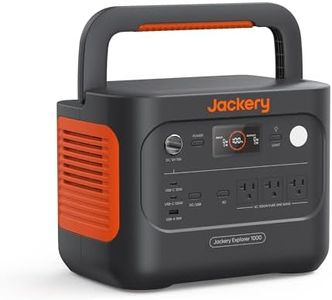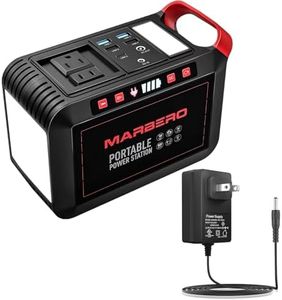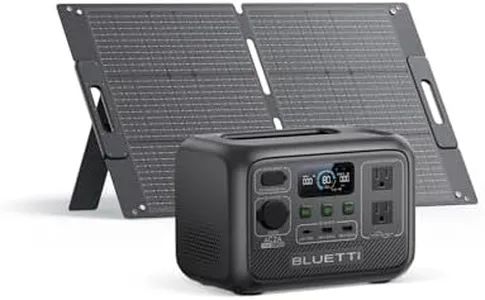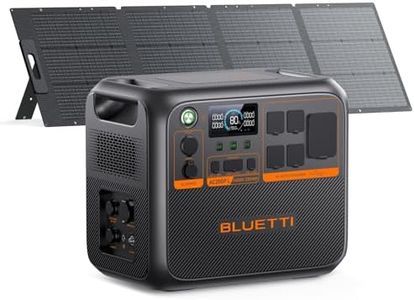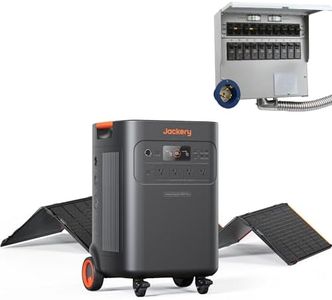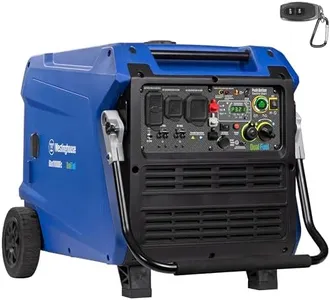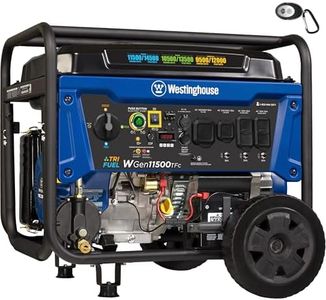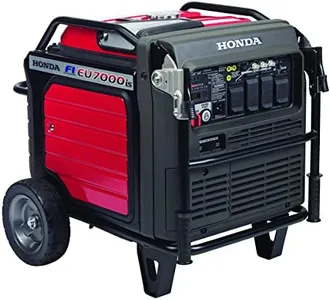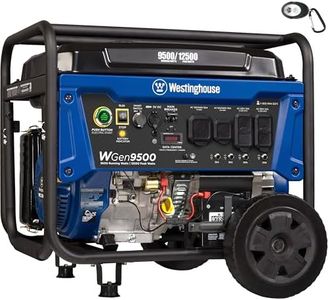10 Best portable quiet generators 2026 in the United States
Our technology thoroughly searches through the online shopping world, reviewing hundreds of sites. We then process and analyze this information, updating in real-time to bring you the latest top-rated products. This way, you always get the best and most current options available.

Our Top Picks
Winner
EF ECOFLOW DELTA Pro 3 Portable Power Station, 4096Wh LFP Battery, Expandable to 48kWh, 120/240V 4000W AC Output, Solar Generator for Home Use, Camping Accessories, Emergencies, Power Outages, RVs
Most important from
519 reviews
The EcoFlow DELTA Pro 3 is a high-capacity portable power station designed to handle heavy-duty power needs with its 4000W continuous output, which can surge up to 6000W or even 12,000W with extra modules. This makes it suitable for running almost all essential home appliances, including large devices like central air conditioners or water pumps. It uses a large 4096Wh lithium iron phosphate (LFP) battery, which is safer and longer-lasting than traditional lithium batteries. One of its standout features is expandability—users can add more batteries to reach up to 48kWh, providing several days of backup power during outages or off-grid situations.
Charging options are very flexible, supporting solar panels, wall outlets, generators, and even EV chargers, so fuel worries are minimal since it’s a non-gasoline, clean energy source. Noise-wise, it operates very quietly at about 30 dB, which is whisper-quiet, making it great for indoor use or camping without disturbing sleep. The unit is portable with a handle but is quite heavy at 115 pounds, so it’s more suitable for those who need powerful, transportable backup rather than something ultra-light. It features inverter technology that ensures smooth, stable power for sensitive electronics and has fast transfer switching to keep devices running without interruption during power failures.
Safety is well-covered with automotive-grade battery cells, an IP65 rating for dust and water resistance, and a solid 5-year warranty backing. The main drawbacks are its weight and size, which might be challenging for frequent transport. Also, its premium features come with a higher price tag. For users needing a robust, quiet, and versatile portable generator that can power big appliances and provide long-lasting backup, the DELTA Pro 3 offers excellent value and peace of mind.
Most important from
519 reviews
EF ECOFLOW Portable Power Station DELTA 2, 1024Wh LiFePO4 (LFP) Battery, 1800W AC/100W USB-C Output, Solar Generator(Solar Panel Optional) for Home Backup Power, Camping & RVs
Most important from
7273 reviews
The EF ECOFLOW Portable Power Station DELTA 2 is a strong choice if you're looking for a quiet, clean alternative to traditional gas generators, especially for camping, RV trips, or home backup. It offers a solid power output of 1800 watts, enough to run most common appliances and devices. One of its standout features is the fast charging ability, reaching 80% charge in just 50 minutes, which is much quicker than many other portable stations. Its lithium iron phosphate (LiFePO4) battery is designed for longevity, lasting 3000+ charge cycles, so you won’t need to replace it often. The unit supports solar charging up to 500W, making it eco-friendly and convenient for off-grid use.
With 15 different outlets, including USB-C, it provides versatile options for powering multiple devices at once. It weighs 27 pounds, which is a bit on the heavier side compared to smaller portable units, but it still remains reasonably portable with two handles. Electric power stations like this tend to be much quieter compared to gas generators. Its inverter technology ensures stable power, safe for sensitive electronics, and the built-in battery management system adds extra safety by preventing overcharge or overheating.
On the downside, the base capacity is 1024Wh, which might not be enough for extended use without adding extra batteries, and the price can be higher than simpler models. Also, since it’s electric, you’ll need access to an outlet or solar panels to recharge. If you want a reliable, quiet, and versatile power source for outdoor adventures or emergency backup, EF ECOFLOW DELTA 2 effectively balances power, speed, and safety.
Most important from
7273 reviews
Jackery Explorer 2000 v2 Portable Power Station with 2x200W Solar Panels, 2042Wh LiFePo4 Battery, 2200W Solar Generator, 20ms UPS, USB-C PD 100W Fast Charging for Power Outages, Emergencies, Camping
Most important from
936 reviews
The Jackery Solar Generator 2000 v2 is a powerful and versatile portable power station well suited for camping, home backup, and small business use. It delivers a strong 2200W output with a large 2042Wh battery capacity, enough to keep essential devices running during outages or outdoor trips. One of its standout features is its quiet operation—thanks to advanced temperature control and silent charging modes, it works without disturbing noise or fumes, unlike gas generators. The unit is powered by a safe and durable LiFePo4 battery that can last up to 10 years, offering a clean energy alternative with no fuel needed as it runs on electricity and solar power.
Portability-wise, it’s relatively compact and lighter than similar capacity units but still weighs about 40 pounds, so it’s best moved with some effort rather than frequently carried long distances. Charging is fast and flexible, with AC, solar, and an emergency super charge option—though solar charging depends on panel availability and sunlight. The built-in inverter technology ensures stable, uninterrupted power with a quick 20ms switch time, protecting sensitive electronics during power drops. Safety is well covered with stable design and UL certification. However, the solar panels may be shipped separately, which might be inconvenient if you expect all components together.
While it’s quiet and clean, it’s not completely silent and its weight might be a consideration for some. This generator suits users looking for a reliable, quiet, and eco-friendly power source with good capacity and advanced features, especially if they are comfortable managing its size and setup.
Most important from
936 reviews
Buying Guide for the Best portable quiet generators
When choosing a portable quiet generator, it's important to consider several key specifications to ensure you select the best fit for your needs. Portable generators are useful for a variety of applications, from camping trips to emergency power during outages. The right generator should provide sufficient power, operate quietly, and be easy to transport. Understanding the key specifications will help you make an informed decision and find a generator that meets your specific requirements.FAQ
Most Popular Categories Right Now
